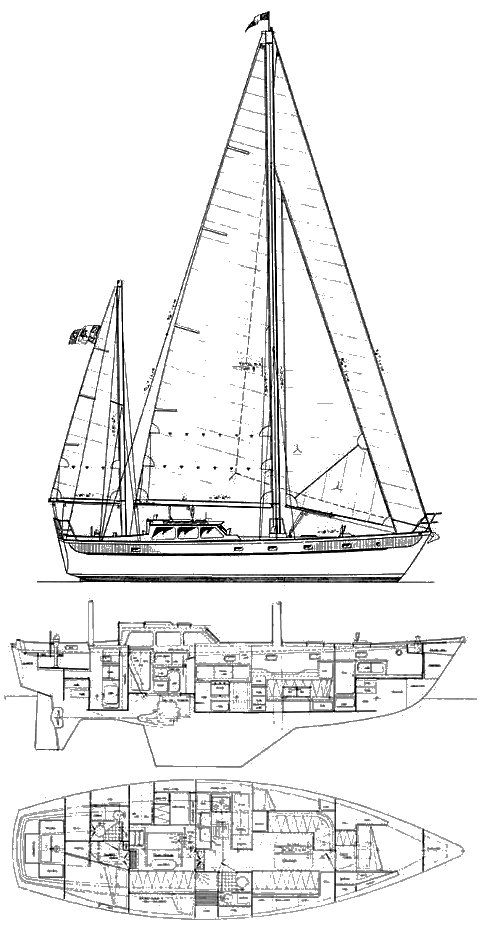The Kanter Atlantic 45 is a distinguished sailboat, conceived as a robust and elegant offshore cruiser. Designed by the respected naval architect Ted Brewer and meticulously built by Kanter Yachts of St. Thomas, Ontario, Canada, this model embodies a commitment to durability and custom craftsmanship. With its significant displacement and ketch rig, the Atlantic 45 is recognized for offering a secure and comfortable platform for extended cruising, appealing to those seeking a strong and capable vessel.
Kanter Atlantic 45 Information, Review, Specs

- Make
- Kanter
- Model
- Atlantic 45
- Number Built
- Production Year(s)
- 1989 - ??
History and Design
The Kanter Atlantic 45 commenced production around 1989, though some specific vessels have been noted with a 1985 model year, suggesting a period of initial builds or design finalization. The design by Ted Brewer, renowned for his offshore-capable yachts, aimed to create a vessel that combined sturdy construction with practical sailing attributes. The vessel is often described as a semi-custom pilothouse cutter, indicating a degree of owner input in its final configuration.
Kanter Yachts, the builder, has consistently championed aluminum as its primary construction material, a choice that underpins their reputation for building exceptionally robust and safe vessels. From its inception, Kanter Marine focused on creating custom-built aluminum vessels, aiming to deliver "the ultimate in safety" and fulfill "every desire" of their owners. This manufacturing ethos during the Atlantic 45's production era ensured a durable and high-quality build. The boat's ketch rig, while specified in the core data, is sometimes described as a "staysail ketch," and the pilothouse configuration is a common feature, suggesting the semi-custom nature allowed for variations tailored to individual owner preferences.
Sailing Performance and Handling
The Kanter Atlantic 45 is characterized by its substantial build, designed for stability and comfort in varying conditions rather than outright speed. With a Sail Area to Displacement (SA/D) ratio of approximately 14.61, she is a heavier cruiser, indicating moderate performance in lighter winds but excelling in more robust conditions. Her Ballast to Displacement (B/D) ratio of approximately 0.347 points to a good degree of stiffness and stability, allowing her to stand up to a breeze effectively. Furthermore, a Displacement to Length (D/L) ratio of approximately 325.96 firmly places her in the category of a heavy, traditional cruiser, emphasizing her solid and seaworthy nature.
Anecdotal descriptions of the Atlantic 45's handling often highlight its stability and robust nature. It is considered a "heavy sailboat which is slightly under powered," yet "reasonably stable / stiff and has an excellent righting capability." The ketch rig contributes significantly to her ease of handling, as the smaller individual sails are more manageable, and it offers enhanced comfort and stability, particularly when sailing downwind or on a broad reach. The fin keel provides good sailing performance and maneuverability, complemented by a secure skeg-hung rudder, contributing to confident control in a seaway.
Accommodations and Layout
While specific interior details can vary due to the Kanter Atlantic 45's semi-custom nature, the general layout is designed for comfortable cruising. A prominent feature on many Atlantic 45s is the pilothouse, which typically serves as a complete helm station. This arrangement often includes full mechanical controls and navigation equipment, along with a dedicated chart table for route planning.
The interior is generally well-appointed, reflecting Kanter's focus on quality custom builds. Typical layouts for a vessel of this size would include a comfortable salon, a galley for meal preparation, and private sleeping cabins, often with a V-berth forward and potentially quarter berths aft. Given Kanter's reputation, the finish quality would likely feature substantial materials, though specific wood trim or fiberglass use would depend on the owner's original specifications. Storage for provisions and gear would be ample, designed for extended voyages, and ventilation would be addressed through hatches and ports suitable for offshore conditions.
Owner's Perspectives
Owners of Kanter yachts, including the Atlantic 45, generally commend the builder's commitment to robust construction and customizability. The relatively low number of pre-owned Kanter yachts on the market underscores their custom, often semi-custom, production approach rather than mass manufacturing, leading to a deeply personalized ownership experience. This strong build quality is often a significant draw for those seeking a safe and reliable vessel for long-distance cruising. While specific recurring issues for the Atlantic 45 are not widely reported in public forums, the focus on heavy-duty aluminum construction suggests a vessel built to endure, aligning with the "strong" boat desired by some owners. Owners often appreciate the direct collaboration with the builder to realize a unique vision for their vessel.
Measurements
Construction & Hull
- Construction Material
- —
- Hull Type
- Monohull Sailboat
- Keel Type
- Fin
- Rudder
- 1x Skeg-Hung
- Ballast
- 12500 lbs
- Displacement
- 36000 lbs
- Water Capacity
- -
- Fuel Capacity
- -
Engine
- Engine Make
- Perkins
- Engine Model
- —
- Engine Type
- —
- Engine HP
- 80
- Engine Count
- 1
- Drive Type
- —
- Fuel Type
- Diesel
Rig & Sails
- Rig Type
- Ketch
- P (Main Luff)
- -
- E (Main Foot)
- -
- I (Foretriangle Height)
- -
- J (Foretriangle Base)
- -
- Forestay Length (est)
- -
- Main Sail Area
- -
- Foretriangle Sail Area
- -
- Total Sail Area (Reported)
- 1021 sqft
- Total Sail Area (Calc)
- -
Dimensions
- LOA
- 44.75 ft
- LWL
- 36.67 ft
- Beam
- 13.92 ft
- Draft
- 6.83 ft
- Max Headroom
- -
- Air Draft
- -
Calculations
- Hull Speed
- 8.11 kn
- Pounds per Inch Immersion
- 1